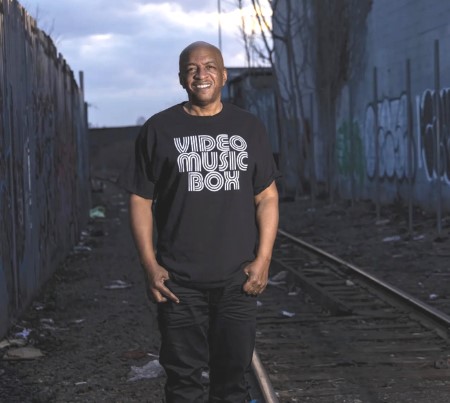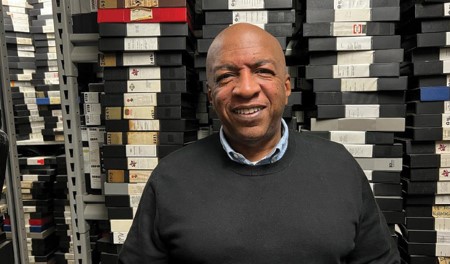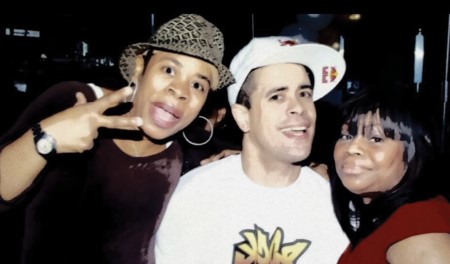Public Employee Press: PEP Talk
QPL’s DJ Ralph McDaniels does it for the culture

If you’ve ever given a shout out, thank Ralph McDaniels, host and creator of New York City’s most successful public television show, Video Music Box (VMB).
McDaniels, also known as ‘Uncle Ralph,’ is the Queens Public Library hip-hop coordinator and historian, and a member of Queens Library Guild Local 1321. He hosts live DJ vinyl sessions on Instagram and Facebook to introduce the next generation to hip-hop culture.
“We are so fortunate to have someone who is actively working to document and preserve hip-hop culture for generations to come and is committed to making our city a safer and better place to live,” said John Hyslop, Local 1321 president. “So many DC 37 members grew up with VMB and will enjoy reading about Ralph and his contributions to our culture and city. I’m sure DC 37 members will be excited to learn that one of their idols is a fellow union member!”
Back in the day, McDaniels’ VMB, the longest running hip-hop show on TV, was the first and only show to air rap music videos. “I played videos like a DJ plays songs,” said McDaniels, who mixed hip-hop pioneers like KRS-One, Fab 5 Freddy, the Message, and Queen Latifah with acts like Madonna, Steely Dan, Shaggy, Blondie, Talking Heads, and other bands with New York City roots. For more than a dozen years, that unique formula kept VMB number one in the New York television market. His platform welcomed newcomers Salt-n-Pepa, Heavy D, Mary J. Blige, Biggie Smalls, Jay-Z, Richard “Crazy Legs” Colon, Queensbridge Houses’ own Nas and Roxanne Shante, and others to promote a new sound that resonated with younger audiences and generated record sales.
“A lot of music executives and radio DJs were reluctant to promote or play hip-hop,” McDaniels said. Without commercial obligations, McDaniels had the freedom to “go deeper underground” on public TV. He mined then-unknowns like Tribe Called Quest, Leaders of the New School, the Wu-Tang Clan, Eve, Onyx and DMX. He played Miami’s Luke Campbell and Too Live Crew, California rappers Ice-T, NWA, Digital Underground and Tupac alongside Bronx rappers Fat Joe and Craig Mack.

The show became the blueprint and precursor for successful rap video shows like Yo! MTV Raps and BET’s Rap City. Run DMC rapper Darryl McDaniels (no relation) said, “The difference Video Music Box made was us showing us versus them showing us.”
McDaniels’ role in shaping the global phenomenon of hip-hop culture and preserving 50 years of Black music is the subject of a 2021 Showtime documentary, “You’re Watching Video Music Box”. Directed by Grammy-nominated artist Nasir “Nas” Jones, the film culls music videos, backstage interviews, and live performances from 30,000 hours of VMB tapes. It features rare footage of freestyling genius in live, onstage collaborations at events McDaniels promoted.
After then-NYC Mayor Rudy Giuliani pulled the plug and sold New York City’s public TV station, a conversation with Russell Simmons led McDaniels to an “aha” moment. Reinventing himself as one of New York’s premiere party promoters, he took his hip-hop show into local clubs where he gave partygoers the microphone between acts to shout out acknowledgments to loved ones on camera. Comedian Tracy Morgan was an opener who credits McDaniels for giving him his start.
McDaniels recorded the hip-hop scene of the ‘80s, ‘90s and ‘00s that exploded and flourished on the periphery of Manhattan nightlife. “In those audiences, I saw something corporate America had missed,” McDaniels said. “I saw the crossover appeal of hip-hop and rap.”
If asked about the moment they fell in love with hip-hop, generations of New Yorkers would point to the ubiquitous influence of Uncle Ralph and Video Music Box. His show captured New York’s creative raw energy and took hip-hop culture from the streets of New York City worldwide, further than anyone could have imagined. The VMB microphone now rests in the Smithsonian.
Not just lyrics and beats, hip-hop culture launched a proliferation of Black entrepreneurship and wealth via tour dates, record sales, independent labels, TV and films, sports management and sports bars, energy drinks, clothing, sneaker deals, and cosmetics. These business ventures rocketed Jay-Z and Rihanna to billionaire status, according to Forbes, and made multi-millionaire luminaries of Diddy, Biggie, Daymond John, 50 Cent, Dr. Dre, and other entertainers of color.

The Library’s online classes with McDaniels teach everything from writing lyrics to sampling and creating beats, the foundations of hip-hop music. He helps students learn how to turn what they love into art, with help from the Keith Haring and the Amazin’ Mets foundations.
“During the pandemic, I worked with the Queens Public Library to host events that connect youth and people of all ages with hip-hop culture,” McDaniels said. “I teach its history and how music is made.”
McDaniels uses the library’s social media platform to tackle the social issues of gun violence, drugs, domestic abuse, and homelessness.
“With this educational component in Queens Library, I hope to inspire future generations to look beyond their environment,” McDaniels said. “They need to realize that we are resilient. We made something from nothing. The next phase is to explore new ideas, to entertain, and to make change in society, whatever that may be.”
Queens Public Library Hip-Hop Coordinator Ralph McDaniels continues to play his all-vinyl DJ sets on Instagram @qplnyc and @videomusicbox, with live streams every Tuesday at 3 p.m. and Saturday at 1 p.m.


